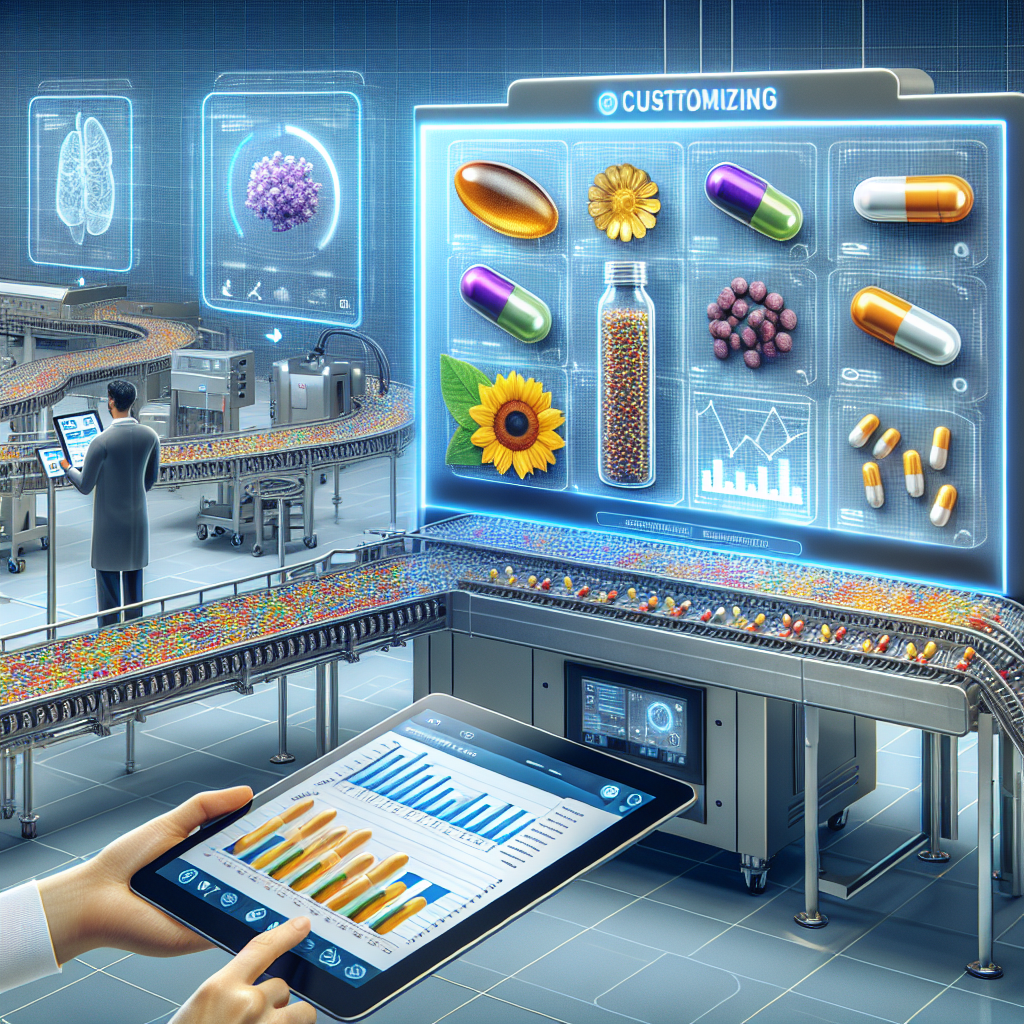The Role of Technology in Customizing Vitamins

Discover how technology is revolutionizing the way we customize vitamins for our unique health needs. Learn more about this innovative approach and how it can benefit you. Click here to explore more.
Exploring the Impact of Technology on Personalized Vitamin Production
The role of technology in customizing vitamins is a fascinating topic that has been gaining significant attention in recent years. As we delve into the 21st century, the intersection of health and technology is becoming increasingly prominent, with personalized vitamin production being a prime example of this trend. This article aims to explore the impact of technology on personalized vitamin production, shedding light on how it has revolutionized the way we approach health and wellness.
The concept of personalized vitamins is rooted in the understanding that each individual has unique nutritional needs. Traditional multivitamins, while beneficial, often adopt a one-size-fits-all approach that may not cater to the specific requirements of every individual. This is where technology steps in, enabling the customization of vitamins to suit individual needs.
The advent of advanced diagnostic tools and genetic testing has been instrumental in this regard. These technologies allow for a comprehensive analysis of an individual’s health status, identifying specific nutritional deficiencies and needs. For instance, a person with a vitamin D deficiency would require a higher intake of this particular vitamin, which can be precisely determined through these tests.
Once these needs are identified, technology plays a crucial role in the actual production of personalized vitamins. Advanced manufacturing techniques, such as 3D printing, have made it possible to produce customized vitamin supplements. These techniques allow for the precise control of the composition and dosage of each vitamin, ensuring that each individual receives exactly what they need.
Moreover, technology has also facilitated the delivery of these personalized vitamins. Online platforms and mobile applications have made it easier for individuals to access their customized vitamins, with some companies even offering home delivery services. This not only enhances convenience but also ensures that individuals can consistently maintain their vitamin intake.
Artificial Intelligence (AI) and machine learning are also playing a significant role in the customization of vitamins. These technologies can analyze large amounts of data, identifying patterns and trends that can help in predicting an individual’s nutritional needs. For instance, AI can analyze a person’s dietary habits, lifestyle, and health history to determine the type and amount of vitamins they require. This predictive capability can significantly enhance the effectiveness of personalized vitamins.
However, while technology has undoubtedly revolutionized the production of personalized vitamins, it is essential to approach this trend with caution. The use of personal health data raises concerns about privacy and security, and it is crucial that these issues are adequately addressed. Furthermore, while personalized vitamins can cater to individual needs, they should not replace a balanced diet and healthy lifestyle.
In conclusion, technology has had a profound impact on the production of personalized vitamins, enabling a more targeted and effective approach to nutritional supplementation. From advanced diagnostic tools and manufacturing techniques to AI and machine learning, technology is reshaping the way we approach health and wellness. As we continue to explore the potential of this intersection, it is clear that the future of health lies in personalization, powered by technology.
The Role of Digital Advancements in Customizing Nutritional Supplements

The role of technology in customizing vitamins is a fascinating intersection of health and digital advancements. As we continue to make strides in the realm of personalized medicine, the ability to tailor nutritional supplements to an individual’s specific needs has become a reality. This is largely due to the rapid evolution of technology, which has provided us with the tools to analyze and understand our bodies on a molecular level.
The journey towards personalized vitamins begins with data collection. Advanced digital tools are now capable of gathering comprehensive health data from individuals. This includes information about their genetic makeup, lifestyle, diet, and even their microbiome – the community of microorganisms living in our bodies. These data points are then analyzed using sophisticated algorithms to identify any nutritional deficiencies or imbalances that may be present.
Once these deficiencies are identified, technology steps in again to help formulate a customized blend of vitamins and minerals to address these specific needs. This is a significant departure from the one-size-fits-all approach that has dominated the supplement industry for decades. Instead of taking a multivitamin with a predetermined mix of nutrients, individuals can now receive a supplement that is tailored to their unique health profile.
The customization process doesn’t stop at formulation. Technology also plays a crucial role in the delivery of these personalized vitamins. Companies are leveraging digital platforms to provide a seamless and convenient experience for their customers. Once the customized blend is formulated, it can be ordered online and delivered straight to the customer’s doorstep. Some companies even offer subscription services, ensuring that individuals never run out of their personalized supplements.
Moreover, the role of technology in customizing vitamins extends beyond the initial formulation and delivery. Digital platforms are also being used to monitor the effectiveness of these supplements and make necessary adjustments over time. For instance, wearable devices can track various health metrics, providing real-time feedback on how the body is responding to the supplements. This data can then be used to refine the formulation, ensuring that it continues to meet the individual’s evolving health needs.
The integration of technology in the customization of vitamins is not just about convenience; it’s about efficacy. Research has shown that personalized supplements can be more effective than generic ones. This is because they are designed to address the specific deficiencies identified in an individual’s health profile, rather than providing a broad spectrum of nutrients that may not be needed.
However, it’s important to note that while technology has made personalized vitamins more accessible, it’s not a substitute for a balanced diet and healthy lifestyle. Supplements are meant to fill nutritional gaps, not replace whole foods that provide a wide range of nutrients and other beneficial compounds.
In conclusion, the role of technology in customizing vitamins is revolutionizing the way we approach nutritional supplementation. By leveraging digital advancements, we can now tailor our intake of vitamins and minerals to our unique health needs, potentially improving the effectiveness of these supplements. As technology continues to evolve, we can expect to see even more personalized and precise approaches to nutrition in the future.
How Technology is Revolutionizing the Customization of Vitamins
The role of technology in customizing vitamins is a fascinating topic that is revolutionizing the health and wellness industry. As we delve into the 21st century, the intersection of technology and health is becoming increasingly prominent, with vitamins being one of the many areas experiencing this transformative shift. The advent of technology has made it possible to tailor vitamins to individual needs, thereby enhancing their effectiveness and ensuring optimal health benefits.
Traditionally, vitamins have been produced in a one-size-fits-all manner. However, this approach often fails to cater to the unique nutritional needs of each individual. With the help of technology, we are now able to move away from this generic approach and towards a more personalized one. This shift is largely due to advancements in data collection and analysis, which allow for a more nuanced understanding of individual health profiles.
One of the key ways technology is facilitating the customization of vitamins is through the use of online questionnaires. These questionnaires gather information about an individual’s lifestyle, diet, health goals, and medical history. This data is then analyzed using sophisticated algorithms to generate a personalized vitamin regimen. This approach ensures that individuals receive the exact nutrients they need, in the right quantities, to support their health and wellness goals.
Another significant technological advancement in this field is the use of DNA testing. By analyzing an individual’s genetic makeup, companies can identify specific nutritional deficiencies or needs. This information is then used to create a customized vitamin regimen that is tailored to the individual’s genetic profile. This level of personalization is unprecedented and has the potential to significantly improve health outcomes.
Moreover, technology is also enhancing the delivery and absorption of vitamins. For instance, microencapsulation technology is being used to improve the bioavailability of vitamins, ensuring that they are absorbed more effectively by the body. This technology involves encasing vitamins in a protective layer, which allows them to pass through the stomach and be absorbed in the intestines, thereby increasing their effectiveness.
Furthermore, technology is also improving the convenience and accessibility of customized vitamins. With the rise of e-commerce, individuals can now order their personalized vitamin regimens online and have them delivered directly to their doorstep. This not only makes the process more convenient but also ensures that individuals are more likely to stick to their vitamin regimen.
In conclusion, technology is playing a pivotal role in revolutionizing the customization of vitamins. By harnessing the power of data analysis, DNA testing, and advanced delivery methods, we are now able to tailor vitamins to individual needs, thereby enhancing their effectiveness and promoting optimal health. As technology continues to evolve, we can expect to see even more innovative approaches to vitamin customization, further transforming the health and wellness industry.